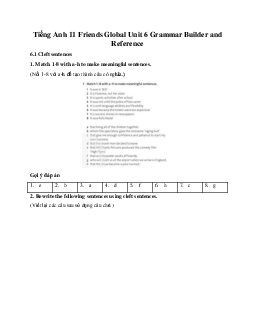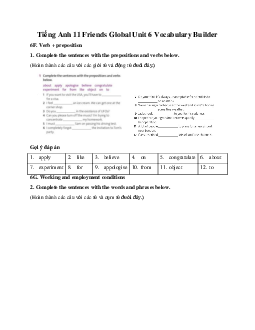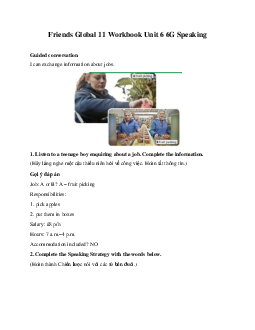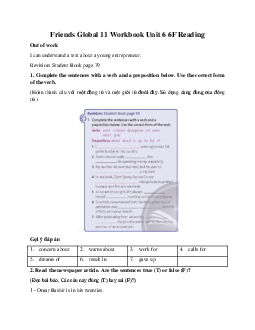



Preview text:
Friends Global 11 Workbook Unit 6 6H Writing
A for and against essay
I can write a for and against essay about education and work. Preparation
More university students should stay in education after their first degree in order to
get another qualification. Do you agree?
(Nhiều sinh viên đại học nên tiếp tục học sau khi có bằng cấp đầu tiên để có được bằng
cấp khác. Bạn có đồng ý không?)
1. Read the task and the model essay. Does the writer agree or disagree with the statement in the task?
(Đọc bài tập và bài luận mẫu. Người viết đồng ý hay không đồng ý với nhận định trong bài tập?) Gợi ý đáp án Agrees
2. Study the model essay and answer the questions. In which paragraph (1-4) does the writer...
(Nghiên cứu bài văn mẫu và trả lời câu hỏi. Trong đoạn văn nào (1-4) tác giả...) Gợi ý đáp án
1 - describe the arguments for? => Paragraph 2
(mô tả các lập luận ủng hộ? => Đoạn 2)
How many does she / he describe? 3
(Cô ấy / anh ấy mô tả bao nhiêu? 3)
2 - describe the arguments against? => Paragraph 3
(mô tả các lập luận chống lại? => Đoạn 3)
How many does she / he describe? 2
(Cô ấy / anh ấy mô tả bao nhiêu? 2)
3 - give his / her opinion? => Paragraph 4 Writing Strategy
3. Read the Writing Strategy. Find and underline a rhetorical question in the model
essay. Choose the expected answer.
(Đọc Chiến lược viết. Tìm và gạch chân một câu hỏi tu từ trong bài văn mẫu. Chọn câu trả lời mong đợi.) Gợi ý đáp án
A rhetorical question in the model essay: “What could be better than spending an extra
two or three years studying something you find fascinating?”
- The expected answer is nothing. Writing Guide
4. Read the task above. Then plan your essay following the paragraph plan below.
Use the questions to help you.
(Đọc nhiệm vụ trên. Sau đó lập kế hoạch cho bài luận của bạn theo kế hoạch đoạn văn
dưới đây. Sử dụng các câu hỏi để giúp bạn.) Gợi ý đáp án
Paragraph 1: Rephrase the statement in the task.
More students should choose to pursue their university degrees abroad rather than in their home country.
Paragraph 2: Arguments for doing a degree abroad.
- Exposure to diverse cultures for a global perspective.
- Access to top-notch faculty and advanced research facilities.
- Opportunity to learn a foreign language for improved communication skills.
Paragraph 3: Arguments against doing a degree abroad.
- Financial burden, including tuition fees and living expenses.
- Potential challenges in adapting to a new cultural environment.
- Concerns about the recognition of foreign qualifications back home.
Paragraph 4: Give your opinion.
The decision to study abroad or domestically depends on individual circumstances, goals,
and resources. It's not a one-size-fits-all choice, and students should consider personal
factors before making an informed decision.
5. Write your essay using your plan from exercise 4.
(Viết bài luận của bạn bằng cách sử dụng kế hoạch của bạn từ bài tập 4.) Gợi ý đáp án
More students should choose to pursue their university degrees abroad rather than in their home country.
Studying abroad offers a myriad of advantages. Firstly, exposure to diverse cultures can
broaden horizons, fostering a more global perspective. Who wouldn't benefit from an
education that transcends borders and provides insights into different ways of life?
Additionally, international institutions often boast top-notch faculty and advanced
research facilities, contributing to a more enriching educational experience. Furthermore,
the opportunity to learn and master a foreign language not only enhances communication
skills but also opens doors to international career opportunities. So, isn't the prospect of a global education appealing?
However, despite these potential benefits, there are valid concerns against pursuing a
degree abroad. The financial burden associated with international education, including
tuition fees and living expenses, is a significant drawback. How practical is it for all
students to afford the often substantial costs of studying abroad? Another concern
revolves around potential challenges in adapting to a new cultural environment,
impacting students' overall well-being and academic performance. Additionally, there
may be limitations in terms of the recognition of foreign qualifications upon returning to
one's home country. Can the potential drawbacks outweigh the benefits for every student?
In conclusion, while studying abroad can undoubtedly offer numerous advantages, it is
crucial to weigh these against the potential challenges. Personal circumstances, financial
considerations, and the specific educational and cultural offerings of both local and
international institutions should be carefully evaluated. In my opinion, the decision to
pursue a degree abroad or in one's own country depends on individual goals, preferences,
and resources. It is not a one-size-fits-all choice, and each student should make an
informed decision based on their unique circumstances and aspirations. After all, isn't
education about tailoring the experience to suit one's individual journey?



